 Democracy had a good night in Georgia on Tuesday night, before facing a brand-new nightmare by Wednesday morning at the far-right U.S. Supreme Court. We cover both on today's BradCast. [Audio link to full show follows this summary.]
Democracy had a good night in Georgia on Tuesday night, before facing a brand-new nightmare by Wednesday morning at the far-right U.S. Supreme Court. We cover both on today's BradCast. [Audio link to full show follows this summary.]
The final votes of the 2022 midterms have at last been cast --- though some counting and recounting remains --- and Georgia's Democratic Sen. Raphael Warnock has been re-elected to his first full 6-year term in the U.S. Senate. His apparent defeat of Herschel Walker, loser Donald Trump's personally selected candidate in Tuesday's runoff election in the Peach State, caps a string of contests that the GOP arguably could have or should have won across the country in a midterm year like this one. But they chose to go with the far-right, loony-tunes candidates preferred by the disgraced former President instead.
After picking up a Senate seat this year, Democrats are set to hold an outright 51 to 49 majority in the upper chamber beginning in January, even as they narrowly lost their majority in the U.S. House. We discuss what all of that is likely to mean and review several remarkable historic milestones for Democrats in this year's anything-but-red-wave midterms.
After a late night of celebration, it was an early morning of worry, as the U.S. Supreme Court heard Moore v. Harper. We have long warned of the dangers of this case for American elections as we know them. The dispute comes from a challenge filed by North Carolina Republicans after the state's Supreme Court nixed partisan U.S. House maps gerrymandered by the state's GOP legislature. The state court ordered new, fair maps to be drawn instead for 2022, when Republicans and Democrats would evenly split the state's 14 House Districts, winning seven seats each in the closely divided state.
But state Republicans sued, arguing a novel, never-before-approved-by-SCOTUS legal theory they've recently discovered in the U.S. Constitution's Elections Clause called the "Independent State Legislature" theory. They argue that the Constitution mandates that state laws regarding federal elections may be created only by state Legislatures and that no judicial review by state courts is allowable.
That means, as argued in Moore, that partisan-gerrymandered Legislatures may create election laws that cannot be vetoed by Governors or overruled by state courts or constitutions. The theory holds that even voter-approved ballot initiatives could suddenly be found unlawful and those same state legislative bodies could also select whoever they wish to be Presidential Electors no matter who state voters actually selected. It is just that insane. But it's actually in front of a corrupted, stolen and packed right-wing SCOTUS on which a radical majority may offer its blessing.
"The blast radius from their theory would sow elections chaos," warned former acting Solicitor General Neal Katyal, one of the three attorneys who argued on behalf of respondents to NC's Republican petitioners, "forcing a confusing two track system with one set of rules for federal elections and another for state ones" with "case after case" being brought before SCOTUS challenging long-established election laws in all 50 states as adopted over the past 233 years.
Gerrymandering expert and author DAVID DALEY of FairVote was in the Courtroom to witness the proceedings at SCOTUS Wednesday morning and joined us this afternoon from the U.S. Capitol to help unpack it all.
"The consequences for this case are seismic," Daley warns. "This is yet another case that could shake the very foundation of our democracy if the court were to find that state legislatures face no constraints, either from a Governor's veto or from a state constitution, or the state Supreme Court, in how they create election law, how they certify elections, how they draw redistricting maps. It would give these state Legislatures complete, unfettered power to effectively do as they will. And that is a terrifying prospect."
We discuss what he describes as the "bonkers" ISL theory and whether, as AP argued today in its coverage, Daley agrees that there were "at least six Supreme Court justices" who "sound skeptical of making a broad ruling that would leave state legislatures virtually unchecked when making rules for elections for Congress and the presidency."
Says Daley, based on what he witnessed at the High Court this morning: "I would say that there were three Justices who were opposed --- the three liberals, Jackson, Sotomayor and Kagan. There were three who seemed very much on board in Thomas, Gorsuch and Alito. And there were three that I would define not as 'skeptical' but as 'Independent State Legislature-curious'. And I don't think they were looking for a way to knock a bonkers theory down."
Tune in for much more on today's program...
(Snail mail support to "Brad Friedman, 7095 Hollywood Blvd., #594 Los Angeles, CA 90028" always welcome too!)
|


 Sunday 'Close Enough' Toons
Sunday 'Close Enough' Toons A Pretty Weak 'Strongman': 'BradCast' 10/30/25
A Pretty Weak 'Strongman': 'BradCast' 10/30/25 'Green News Report' 10/30/25
'Green News Report' 10/30/25
 Proposal for 'First Politically Viable Wealth Tax' Takes Shape in CA: 'BradCast' 10/29/25
Proposal for 'First Politically Viable Wealth Tax' Takes Shape in CA: 'BradCast' 10/29/25 Monster Storm, Endless Wars, Gamed Elections:
Monster Storm, Endless Wars, Gamed Elections: 'Green News Report' 10/28/25
'Green News Report' 10/28/25 Let's Play 'Who Wants
Let's Play 'Who Wants Sunday 'Cartoonists Dilemma' Toons
Sunday 'Cartoonists Dilemma' Toons Exiled NOAA Scientists Resurrect Critical Disaster Database: 'BradCast' 10/23/25
Exiled NOAA Scientists Resurrect Critical Disaster Database: 'BradCast' 10/23/25  'Green News Report' 10/23/25
'Green News Report' 10/23/25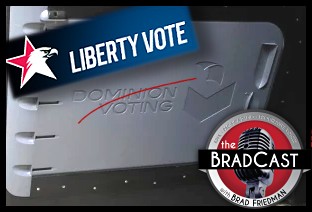 Trump-Allied GOP Partisan Buys Dominion Voting Systems: 'BradCast' 10/22/25
Trump-Allied GOP Partisan Buys Dominion Voting Systems: 'BradCast' 10/22/25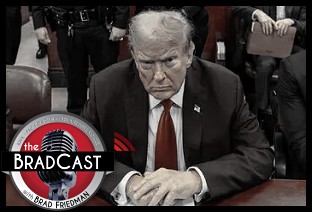 Trump, Republican Law(lessness) & (Dis)Order: 'BradCast' 10/21/25
Trump, Republican Law(lessness) & (Dis)Order: 'BradCast' 10/21/25 'Green News Report' 10/21/25
'Green News Report' 10/21/25 Celebrating 'No Kings': 'BradCast' 10/20/25
Celebrating 'No Kings': 'BradCast' 10/20/25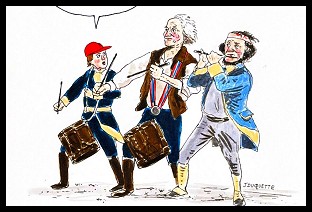 Sunday 'How It Started' Toons
Sunday 'How It Started' Toons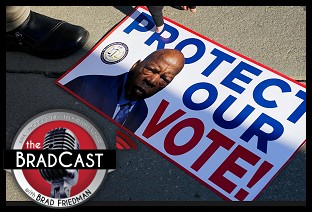 SCOTUS Repubs Appear Ready to Gut Rest of Voting Rights Act: 'BradCast' 10/16/25
SCOTUS Repubs Appear Ready to Gut Rest of Voting Rights Act: 'BradCast' 10/16/25 'Green News Report' 10/16/25
'Green News Report' 10/16/25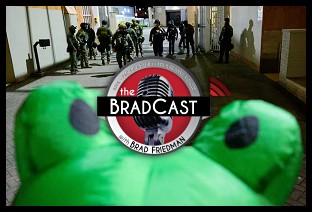 The 'Epstein Shutdown' and Other Autocratic Nightmares: 'BradCast' 10/15/25
The 'Epstein Shutdown' and Other Autocratic Nightmares: 'BradCast' 10/15/25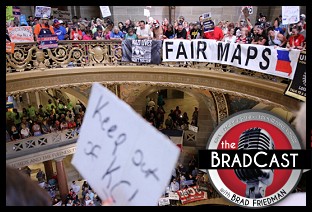 Group Vows to Block MO's GOP U.S. House Gerrymander: 'BradCast' 10/14/25
Group Vows to Block MO's GOP U.S. House Gerrymander: 'BradCast' 10/14/25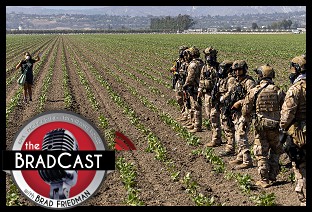 Trump Labor Dept. Warns Trump Policies Sparking Food Crisis: 'BradCast' 10/9/25
Trump Labor Dept. Warns Trump Policies Sparking Food Crisis: 'BradCast' 10/9/25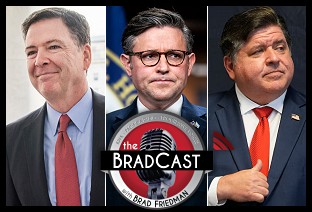 Trump's Losing Battles: 'BradCast' 10/8/25
Trump's Losing Battles: 'BradCast' 10/8/25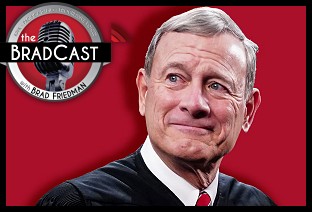 Trump, Roberts and His Stacked, Packed and Captured SCOTUS: 'BradCast' 10/7/25
Trump, Roberts and His Stacked, Packed and Captured SCOTUS: 'BradCast' 10/7/25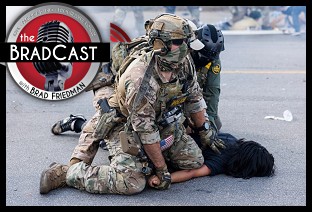 Trump Attempting His 'Invasion from Within': 'BradCast' 10/6/25
Trump Attempting His 'Invasion from Within': 'BradCast' 10/6/25 Biden Budget Expert: Mass Firings in Shutdown 'Illegal': 'BradCast' 10/2/25
Biden Budget Expert: Mass Firings in Shutdown 'Illegal': 'BradCast' 10/2/25 Why is DOJ Suing 'Blue' States for Their Voter Databases?: 'BradCast' 10/1/25
Why is DOJ Suing 'Blue' States for Their Voter Databases?: 'BradCast' 10/1/25
 VA GOP VOTER REG FRAUDSTER OFF HOOK
VA GOP VOTER REG FRAUDSTER OFF HOOK Criminal GOP Voter Registration Fraud Probe Expanding in VA
Criminal GOP Voter Registration Fraud Probe Expanding in VA DOJ PROBE SOUGHT AFTER VA ARREST
DOJ PROBE SOUGHT AFTER VA ARREST Arrest in VA: GOP Voter Reg Scandal Widens
Arrest in VA: GOP Voter Reg Scandal Widens ALL TOGETHER: ROVE, SPROUL, KOCHS, RNC
ALL TOGETHER: ROVE, SPROUL, KOCHS, RNC LATimes: RNC's 'Fired' Sproul Working for Repubs in 'as Many as 30 States'
LATimes: RNC's 'Fired' Sproul Working for Repubs in 'as Many as 30 States' 'Fired' Sproul Group 'Cloned', Still Working for Republicans in At Least 10 States
'Fired' Sproul Group 'Cloned', Still Working for Republicans in At Least 10 States FINALLY: FOX ON GOP REG FRAUD SCANDAL
FINALLY: FOX ON GOP REG FRAUD SCANDAL COLORADO FOLLOWS FLORIDA WITH GOP CRIMINAL INVESTIGATION
COLORADO FOLLOWS FLORIDA WITH GOP CRIMINAL INVESTIGATION CRIMINAL PROBE LAUNCHED INTO GOP VOTER REGISTRATION FRAUD SCANDAL IN FL
CRIMINAL PROBE LAUNCHED INTO GOP VOTER REGISTRATION FRAUD SCANDAL IN FL Brad Breaks PA Photo ID & GOP Registration Fraud Scandal News on Hartmann TV
Brad Breaks PA Photo ID & GOP Registration Fraud Scandal News on Hartmann TV  CAUGHT ON TAPE: COORDINATED NATIONWIDE GOP VOTER REG SCAM
CAUGHT ON TAPE: COORDINATED NATIONWIDE GOP VOTER REG SCAM CRIMINAL ELECTION FRAUD COMPLAINT FILED AGAINST GOP 'FRAUD' FIRM
CRIMINAL ELECTION FRAUD COMPLAINT FILED AGAINST GOP 'FRAUD' FIRM RICK SCOTT GETS ROLLED IN GOP REGISTRATION FRAUD SCANDAL
RICK SCOTT GETS ROLLED IN GOP REGISTRATION FRAUD SCANDAL VIDEO: Brad Breaks GOP Reg Fraud Scandal on Hartmann TV
VIDEO: Brad Breaks GOP Reg Fraud Scandal on Hartmann TV RNC FIRES NATIONAL VOTER REGISTRATION FIRM FOR FRAUD
RNC FIRES NATIONAL VOTER REGISTRATION FIRM FOR FRAUD EXCLUSIVE: Intvw w/ FL Official Who First Discovered GOP Reg Fraud
EXCLUSIVE: Intvw w/ FL Official Who First Discovered GOP Reg Fraud GOP REGISTRATION FRAUD FOUND IN FL
GOP REGISTRATION FRAUD FOUND IN FL

































